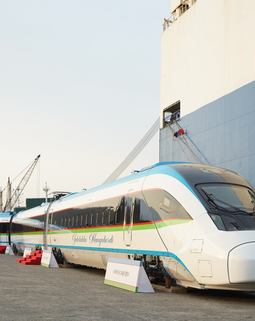Uzbekistan and Tajikistan are on the brink of launching a collaborative project for the joint production of cars, marking a significant milestone in the automotive industry of both nations. The meeting between the head of the Uzbek Ministry of Investment, Industry, and Trade, Laziz Kudratov, and the Tajik Minister of Economic Development and Trade, Zavki Zavkizoda, signals a strategic partnership aimed at enhancing local car manufacturing capabilities and fostering economic cooperation between the two countries.
Collaborative Car Production Project:
Discussions between Uzbekistan and Tajikistan center on a collaborative venture to bolster the automotive sector, demonstrating a mutual dedication to industry advancement. Beyond vehicle production, plans include the manufacture of car tyres for Uzbekistan at Tajik enterprise Talco's facilities, broadening the scope of cooperation. Renowned for its production of aluminum products, calcium fluoride, and salts, Talco is primed to assume a pivotal role in supporting Uzbekistan's automotive industry. This initiative not only underscores the two nations' commitment to economic cooperation but also signifies a strategic alignment to leverage each other's strengths for mutual benefit. By fostering such partnerships, Uzbekistan and Tajikistan aim to enhance regional integration, stimulate industrial growth, and capitalize on emerging opportunities in the automotive market.
Hydroelectric Power Plant Construction:
In addition to the car production venture, Uzbekistan and Tajikistan are exploring opportunities for cooperation in the energy sector. Central to these discussions is the construction of two hydroelectric power plants on the Zarafshan River, with an estimated project cost of $552 million. These power plants are projected to generate 1.4 billion kWh of electricity annually, significantly contributing to the energy security and sustainability goals of both nations.
This collaboration underscores a mutual commitment to enhancing regional energy infrastructure and sustainability. By harnessing the hydroelectric potential of the Zarafshan River, both countries aim to reduce their reliance on fossil fuels, lower greenhouse gas emissions, and promote renewable energy sources. The project is expected to provide a reliable and sustainable electricity supply, supporting economic growth and improving the quality of life for the populations of Uzbekistan and Tajikistan. Additionally, this joint venture fosters stronger bilateral relations and regional cooperation, setting a precedent for future collaborative efforts in various sectors.
Economic and Industrial Collaboration:
The joint initiatives between Uzbekistan and Tajikistan underscore a broader commitment to economic and industrial collaboration, aiming to leverage each other's strengths and resources for mutual benefit. By exploring opportunities in car production, energy infrastructure development, and industrial partnerships, both countries are laying the foundation for enhanced economic ties and sustainable growth in key sectors.
Conclusion:
The collaborative efforts between Uzbekistan and Tajikistan to launch a joint car production project and explore energy infrastructure development signify a strategic partnership aimed at fostering economic cooperation and industrial growth. By pooling their resources and expertise in the automotive and energy sectors, both nations are poised to unlock new opportunities for economic development, technological advancement, and sustainable growth. The joint venture in car production and energy infrastructure construction sets the stage for a fruitful partnership that promises to drive innovation, create employment opportunities, and strengthen the economic ties between Uzbekistan and Tajikistan.





